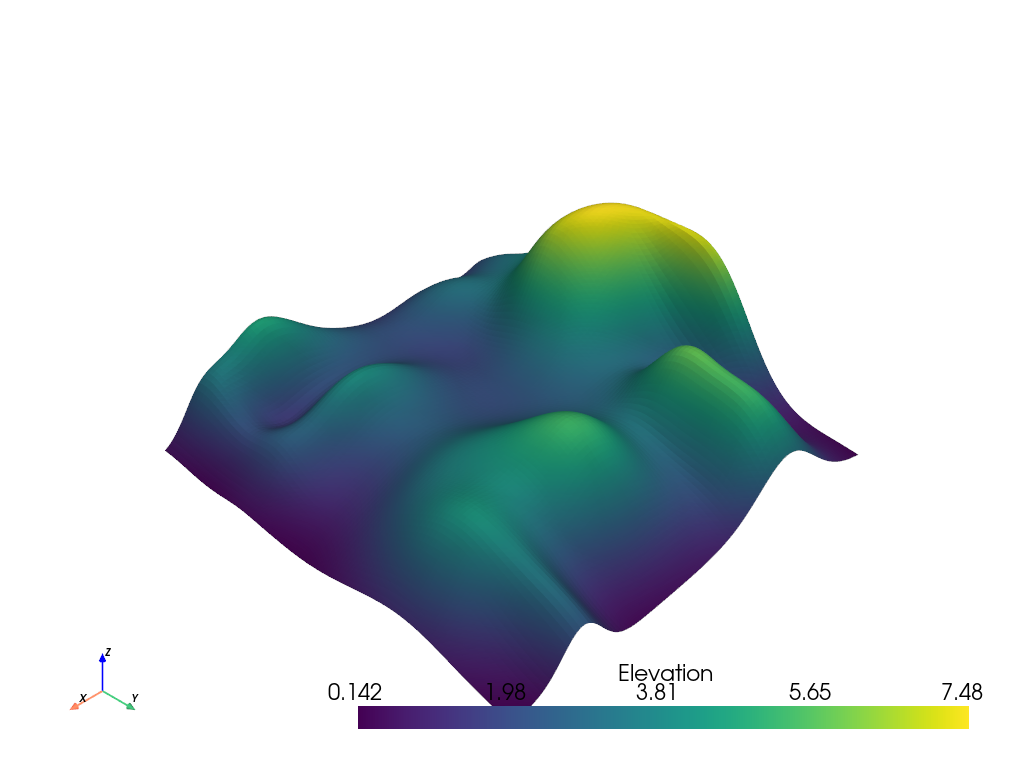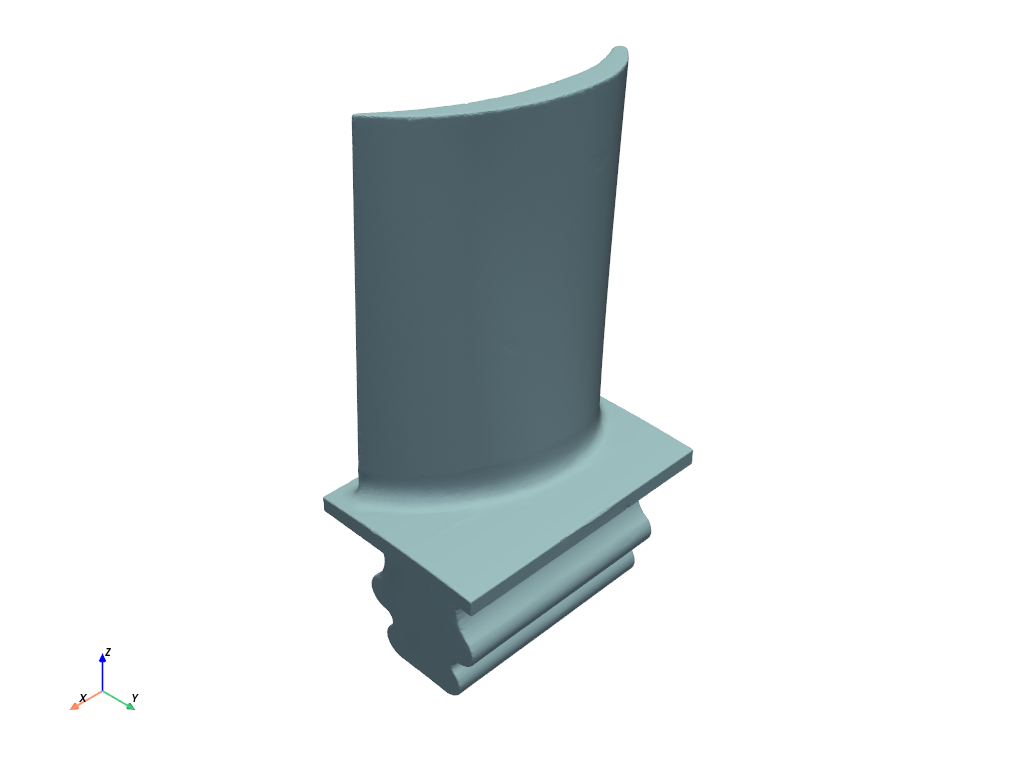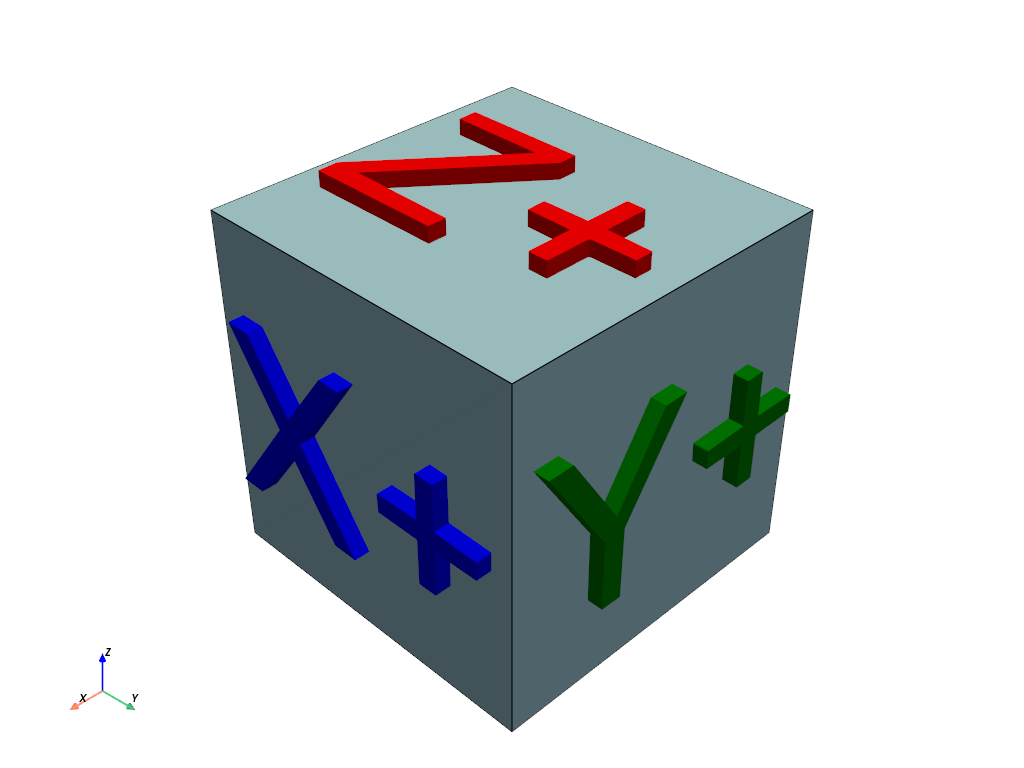Examples#
PyVista contains a variety of built-in demos and downloadable example datasets.
Built-In#
Several built-in datasets are included and are available for offline use.
For example, load the built-in load_random_hills()
dataset:
>>> from pyvista import examples
>>> hills = examples.load_random_hills()
>>> hills.plot()

See the API reference for more examples:
Built-in examples that ship with PyVista and do not need to be downloaded. |
Downloads#
Many datasets are too large to be included with PyVista, but can be
downloaded and cached locally. For example, we can download the
download_turbine_blade() dataset:
>>> from pyvista import examples
>>> blade_mesh = examples.download_turbine_blade()
>>> blade_mesh.plot()

See the API reference for more downloads:
Downloadable datasets collected from various sources. |
Demos#
PyVista also contains some demos which can be used to quickly demonstrate features. For example, we can create and show the orientation cube plotter demo:
>>> from pyvista import demos
>>> plotter = demos.orientation_plotter()
>>> plotter.show()

See the API reference for more demos:
Demos to show off the functionality of PyVista. |
Planets#
Examples of planets and celestial bodies are also included. See the API reference for details:
Downloadable datasets of 3D Celestial Bodies. |
3D Scene Datasets#
Some file formats are imported directly by the pyvista.Plotter
instead of using pyvista.read(). These formats represent 3D geometry,
materials, and scene structure.
Examples of file formats supported by PyVista include VRML
(VirtualReality Modeling Language), 3DS (3D Studio), and
glTF (Graphics Library Transmission Format).
See the API reference for details:
Contains vrml examples. |
|
Contains 3ds examples. |
|
Contains glTF examples. |
Cells#
Many examples of VTK cell types are
available. These functions create single-cell pyvista.UnstructuredGrid
objects which can be useful for learning about the different cells.
See the API reference for details:
Contains a variety of cells to serve as examples. |
Dataset Gallery#
Most of PyVista’s datasets are showcased in the dataset gallery. You can browse the gallery to find a particular kind of dataset and view file and instance metadata for all datasets.
Usage Considerations#
Warning
As you browse this repository and think about how you might use our 3D models and range datasets, please remember that several of these artifacts have religious or cultural significance. Examples include the Buddha, a religious symbol revered by hundreds of millions of people; the dragon, a symbol of Chinese culture, the Thai statue, which contains elements of religious significance to Hindus; and Lucy, a Christian angel commonly seen as statues in Italian churches. Keep your renderings and other uses of these particular models in good taste. Don’t animate or morph them, don’t apply Boolean operators to them, and don’t simulate nasty things happening to them (like breaking, exploding, melting, etc.). Choose another model for these sorts of experiments. (You can do anything you want to the Stanford bunny or the armadillo.)
Downloads Cache and Data Sources#
If you have an internet connection and a normal user account, PyVista should be able to download and cache examples without an issue. The following two sections deal with those who wish to customize how PyVista downloads examples.
Cache#
PyVista uses pooch to download and store the example files in a local cache. You can determine the location of this cache at runtime with:
>>> from pyvista import examples
>>> # Get the local examples path on Linux
>>> examples.PATH
'/home/user/.cache/pyvista_3'
You can clear out the local cache with examples.delete_downloads() if needed.
If you want to override this local cache path, set the
PYVISTA_USERDATA_PATH environment variable. This path must be writable.
Data Sources#
PyVista uses PyVista/vtk-data as
the main source for example data. If you do not have internet access or you
prefer using a local or network directory instead, you can override this
source with the VTK_DATA_PATH environment variable.
The following example first clones the git repository and then exports that
directory to PyVista via VTK_DATA_PATH. Note how the path ends in
'Data' since we need to specify the exact directory of the Data for
pooch.
git clone https://github.com/pyvista/vtk-data.git
export VTK_DATA_PATH=/home/alex/python/vtk-data/Data